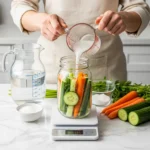Description
Master the ancient art of preserving your veggies through the simple, powerful process of vegetable fermentation. Learn everything from the science behind lacto-fermentation to brine ratios, stages of fermentation, and how to achieve perfect tangy, probiotic-packed results.
Ingredients
- Fresh vegetables (cabbage, carrots, radishes, broccoli, cauliflower, or green beans)
- Non-chlorinated water
- Quality sea salt
- Optional herbs and spices (dill, garlic, bay leaves, etc.)
- Mason jars or fermentation vessels
- Fermentation weights or cabbage leaves
Instructions
- Wash vegetables thoroughly and cut them into desired shapes (slices, sticks, or chunks).
- Prepare a 2% brine by dissolving 20g of sea salt into 1 liter of non-chlorinated water.
- Pack vegetables tightly into a clean, sterilized jar.
- Pour the brine over the vegetables until completely submerged.
- Use a fermentation weight, smaller jar, or cabbage leaf to keep everything under the brine.
- Cover loosely to allow gases to escape while keeping dust and debris out.
- Let ferment at room temperature (60–70°F) for 5–10 days or longer for deeper flavor.
- Taste after day 5; when tangy and flavorful, transfer to refrigerator to slow fermentation.
- Enjoy as a gut-healthy snack or condiment!
Notes
Use non-chlorinated water to protect beneficial bacteria. Always keep vegetables fully submerged in brine to prevent mold. Taste regularly to find your preferred level of tanginess.
- Prep Time: 30 minutes
- Cook Time: 0 minutes
- Category: Fermentation & Preservation
- Method: Lacto-Fermentation
- Cuisine: Global
Nutrition
- Serving Size: 1/2 cup
- Calories: 25
- Sugar: 2g
- Sodium: 300mg
- Fat: 0g
- Saturated Fat: 0g
- Unsaturated Fat: 0g
- Trans Fat: 0g
- Carbohydrates: 5g
- Fiber: 2g
- Protein: 1g
- Cholesterol: 0mg
Keywords: vegetable fermentation, fermented vegetables, lacto-fermentation, probiotics, gut health
